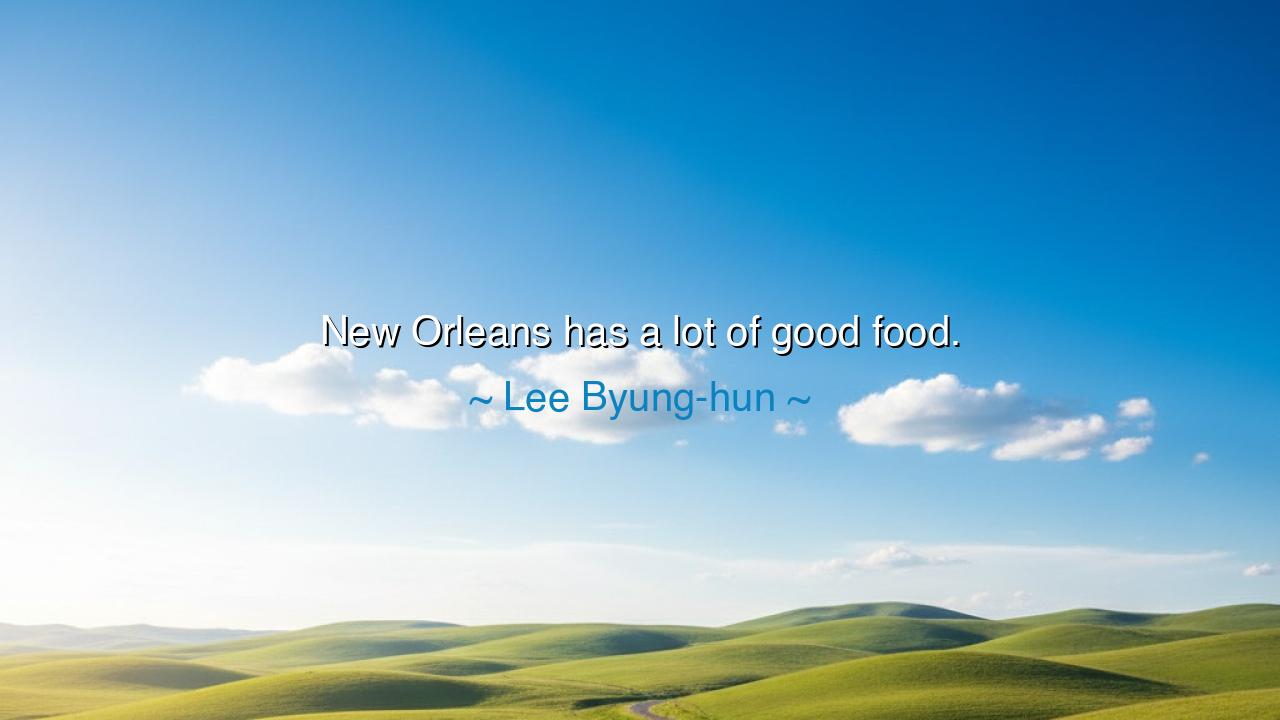
New Orleans has a lot of good food.






Host: The sun dipped low over the Mississippi, spilling amber light across the French Quarter. The air was thick with music — trumpets, laughter, and the distant drumbeat of a parade rolling down Bourbon Street. The smell of gumbo, crawfish, and fried oysters drifted through the humid dusk, blending with the sweet smoke of beignets and spilled whiskey.
Inside a small corner café, the windows open to the warm wind, Jack and Jeeny sat across from each other. The table between them was cluttered with plates — half-eaten po’ boys, a bowl of jambalaya, and a cold bottle of Abita beer sweating on the wood.
Jack’s gray eyes flickered with that familiar mix of skepticism and weariness, while Jeeny’s gaze carried the glow of quiet wonder. The city hummed around them — alive, imperfect, beautiful.
Jeeny: “You know what Lee Byung-hun said once? ‘New Orleans has a lot of good food.’”
Jack: (smirking) “That’s an understatement. This city’s a feast with a heartbeat.”
Jeeny: “But it’s more than food, isn’t it? It’s memory. It’s culture turned into flavor. Every bite tastes like something that survived.”
Jack: “Or something that’s been sold. Don’t romanticize it, Jeeny. This town learned how to turn pain into tourism. Even the gumbo has a story about suffering somewhere in it.”
Host: The light outside shimmered off the wet pavement, where buskers played brass horns beneath flickering signs. A saxophone cried somewhere down the block — long, lonely, like a confession sung into the night.
Jeeny: “Is that what you see when you taste this?” (gestures to the food) “You taste exploitation?”
Jack: “I taste survival. And survival’s never pretty. Don’t you think it’s strange that we celebrate a city by eating what it had to cook to endure? The slaves, the immigrants, the poor — they didn’t invent these dishes for art. They did it to stay alive.”
Jeeny: “And that’s exactly why it’s beautiful. Because they made art out of necessity. Isn’t that what all culture is — pain, transformed?”
Jack: “Or disguised. This place sells soul as spectacle. Look outside — tourists snapping photos of graves, pretending they understand resilience.”
Jeeny: “Maybe they don’t understand it. But maybe they feel it. That’s the power of a place like this — you don’t have to know the story to taste the truth.”
Host: The café lights buzzed softly. A ceiling fan turned lazily overhead, stirring the warm air scented with cayenne and sugar. The street outside erupted in a burst of cheers as a brass band marched by, trumpets blaring, feet stamping on the old stones.
Jack: “You think flavor can carry history?”
Jeeny: “I think it’s the only thing that ever does. Taste survives when memory fades. People forget names, dates, even faces — but they remember the way something tasted when they were happy, or hurt, or home.”
Jack: “So you think this plate of shrimp étouffée is philosophy now?”
Jeeny: “No. I think it’s testimony. Every spice, every recipe, every burnt pot tells the truth that books don’t.”
Host: A brief silence fell between them. Jack picked up a fork, turned it over, then stabbed at the last shrimp, his expression half thoughtful, half haunted.
Jack: “You know… when I first came here, I didn’t get it. The noise, the chaos, the heat. But one night, I walked into a bar off Royal Street. This old woman was singing — I mean really singing — about loss, about Katrina, about rebuilding. And then, between verses, she laughed. Laughed like someone who’d already been through the worst. That’s when I understood. New Orleans doesn’t die. It just cooks itself back to life.”
Jeeny: “Exactly. That’s why I love that quote. ‘New Orleans has a lot of good food’ — it sounds simple, but it’s profound. Because in this city, food isn’t comfort. It’s resistance.”
Jack: “And indulgence.”
Jeeny: “Both. That’s what makes it human. You can’t separate suffering from joy here. They’re served on the same plate.”
Host: The rain began again, sudden and heavy, pounding the street in rhythmic bursts. The music outside didn’t stop — it grew louder, stronger, like the city was singing against the storm.
Jeeny: “This city’s like jazz, Jack. Imperfect, improvised, but alive in every note.”
Jack: “Maybe that’s what I like about it. You can’t fake it. Every note’s earned.”
Jeeny: “So is every bite.”
Host: The lights dimmed slightly as the power flickered. Jeeny leaned closer, her voice soft but sure.
Jeeny: “Do you ever think places can change people?”
Jack: “Only if they get under your skin first.”
Jeeny: “New Orleans gets under your soul.”
Jack: “Or into your stomach.” (grins faintly)
Jeeny: “Same thing.”
Host: The rain slowed, then stopped. A thin mist hung over the street, reflecting the neon signs and the moonlight in rippling puddles. The band had moved on, but the faint echo of their song lingered, carried by the humid air like a ghost refusing to leave.
Jack: “You know what’s funny? I came here thinking I’d find escape. Turns out I found flavor instead. Maybe that’s the same thing.”
Jeeny: “Maybe escape isn’t about leaving. Maybe it’s about tasting the world differently.”
Jack: “Tasting as understanding.”
Jeeny: “Exactly.”
Host: The camera would have panned out now — the two figures in a golden-lit café, the street outside glistening from rain, the faint echo of music trailing off into the night.
Jack raised his glass; Jeeny did the same.
Jack: “To survival.”
Jeeny: “To flavor.”
Jack: “Same thing.”
Host: The glasses clinked, and the scene froze there — a moment steeped in heat, history, and heart. The city outside kept singing, and in that song, every note, every taste, every heartbeat whispered the same truth:
New Orleans doesn’t just feed you. It remembers you.






AAdministratorAdministrator
Welcome, honored guests. Please leave a comment, we will respond soon